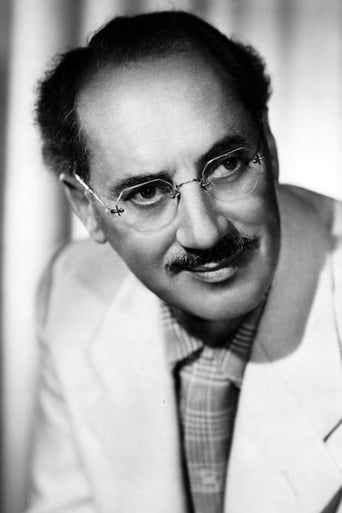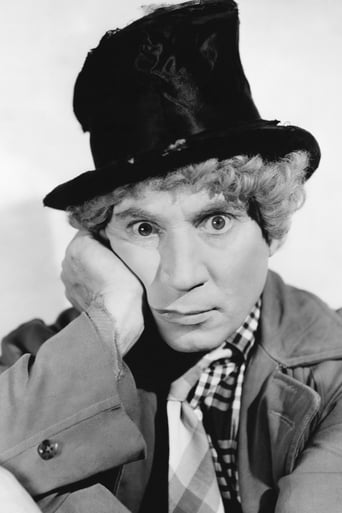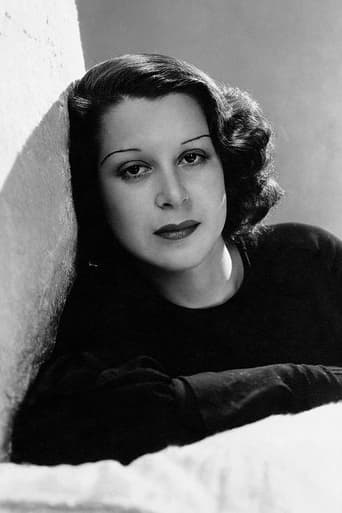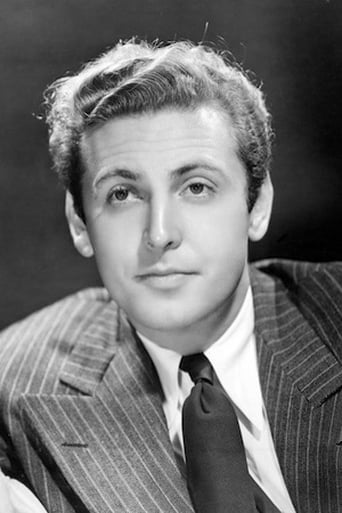Bryan Bjerke
This movie is in the AFI Top 100 movies of all time so I decided to give it a go. I unfortunately was rather bored watching it. The most memorable part of the movie was the piano and harpsichord scene. It had the comedy in the beginning and then drifted toward some beautiful harpsichord playing. The transition was perfectly executed in that scene. The rest of the movie fell flat however. A lot of the comedy doesn't hold up too well nowadays and there was too much singing. I'm not a fan of opera singing in the first place and it you are like that too, you may get annoyed. The story was alright but it had a cheesy ending. It was so cheesy, that it was actually one of the few times that I laughed (even though you weren't supposed to).Overall - Wouldn't recommend this film nowadays, especially for the younger generation. Charlie Chaplin's films has comedy that holds up better than this one. I have no doubt it was good for it's time, but some films just do not age too well.
ElMaruecan82
"Half the laughs and twice the money" that was Irwin Thalberg's equation when he hired the Marx Brothers for their new MGM contract and it sure paid off if the first movie was the 1935 classic, "A Night at the Opera", one of their best, if not the second best after "Duck Soup", or third after "Animal Crackers". This is basically "Duck Soup" with a plot, with more heart and less cynicism and let's admit it, a few sappy and musical moments... but so few, I didn't think they spoiled the enjoyment.Before the MGM, Paramount consecrated the Marx Brothers as the new sound of comedic talent, proof that humor needed the talkies, and after Chaplin, Keaton and Lloyd, there was room for a chatterbox like Groucho Marx, a wise guy like Chico, and a honking maniac (who knew how to handle silent humor) like Harpo. But it's all in the persona of Groucho Marx, his wisecracking that would later inspire Bugs Bunny, the way he constantly teases a bewildered Margaret Dumont who easily loses the track of his machine-gun firing insults or the sense of natural anarchy and mayhem caused by the three siblings.Intelligence, subversion, chaos, that was the Marx Brothers before Thalberg felt the need to tone it down in order to match the more politically correct requirement of the audience. Yes, those were the Code's days and "Duck Soup" was perhaps too subversive and politically loaded for its own good. So the point was to change the formula and not rely too much on their unpredictable behavior but use a plot as a clothesline where to hang their antics and weird behavior... make them more sympathetic, Harpo would become like a child figure rather than his Benny Hill precursor persona and the brothers will always serve the interest of a young romantic couple, against a generally one-dimensional bad guy. That was the formula of the MGM period, being "foils" that didn't fool us, it worked to a certain degree, but in "A Night in the Opera", despite the sappy romantic interludes and musical "fillers", the film is still in the same vein of zaniness than "Duck Soup". I did the counting, there are exactly five minutes of the "Alone" meowing, I mean, singing, ten minutes of "Cosi Cosa" and Chico and Harpo playing their trademark instruments, and the romantic moments between Allan Jones and Kitty Carlisle or the bad guy, don't exceed twenty minutes. So basically, in a runtime of ninety minutes, you have seventy minutes of fun, and sequences as classic one another.Think about it, the restaurant scene with Dumont, the contract scene with Chico, the iconic room filling sequence where each new guest inspired a new hilarious comment from Marx, that "you have everything" 'no one ever complained" exchange that got past the censor, and the great spectacular finale at the opera. 1935 was the year Donald trolled the band concert by playing "Turkey in the Straw" during the William Tell Overture, but I'm not sure if it beats "the Baseball Music" playing at the Scala. But recollecting the great moments of "A Night at the Opera" isn't interesting, the problem is that the film marks both a new era for the siblings but a sort of beginning of the end.If we except "A Day At the Races", the other movies don't play the same league for the simple reason that the formula could only depend on the inspiration in the comedic moments and the more films they made, the less gags and the sappier the romance went. Even in "A Night at the Opera", you're tempted to skip the parts while "Duck Soup" is perfect from beginning to end. The Brothers were so ahead of their time they had to serve as foils for plot elements that ruined their films and totally forgettable. Imagine if they could have done similar movies even unsuccessful, the treasure it would have been.It was French comedic actor Louis de Funès who said at the peak of his career that he wouldn't accept anymore to be directed, advised yes, but director not. According to him, a comic actor alone could understand the range of his talent and many comedians didn't get their deserved success because they followed the instructions of directors who knew nothing. It was his perception (and agreeable) that the comics were perhaps the only auteur in acting and any interference could ruin the intended effects. I don't think this really applies in the case of "A Night at the Opera", even Groucho Marx admitted it was a wise choice.But as good as it is, the film sets a precedent and provides the ludicrous idea that a Marx Brothers movie could be a vehicle for a banal romance, meant to promote two MGM stars. With a reasonable timing and good 'interludes', maybe, but who would believe the audience came to watch anyone but the Marx Brothers?
Matt Greene
"I told you to slow down, I nearly heard the opera." I'm kind of obsessed with Groucho's one-liners. And Harpo and Chico's music. And the stateroom pile-up. And the air force disguises. And the contract bit. And the switching beds between the two hotel rooms. The Marx Bros weren't just anarchic, they were downright chaotic, in all the best ways.
framptonhollis
The interesting thing about "A Night at the Opera" is how much of a genuine, cliché plot it has. There is an obvious villain and protagonist, and both have goals that end in nothing but predictability. However, it gets interesting when the main attraction, that being the brilliant wit of the Marx Brothers, steps in. Every character other than these three wonderful, wild buffoons, is of a cliché and predictable nature, but they certainly aren't! While everyone else is playing it straight, they prove that they're still the same old Marx Brothers as they showcase some of their most hilarious and creative gags. I just find it truly unique and entertaining how this film feels as if its trying to be a predictable and heartwarming musical, but it keeps being interrupted by the absolutely unpredictable creativity of the Marx Brothers. The fact that everybody else is playing it so straight just adds to the great comedy here. Its all so creative and fantastic, and it is all the more creative and all the more fantastic when it is set up against the backdrop of what would normally be considered a melodramatic Hollywood musical!






